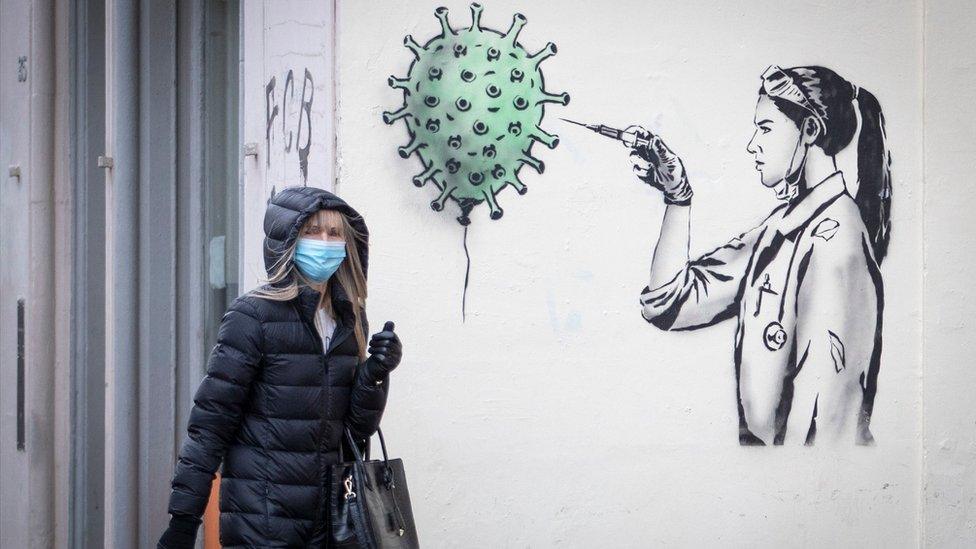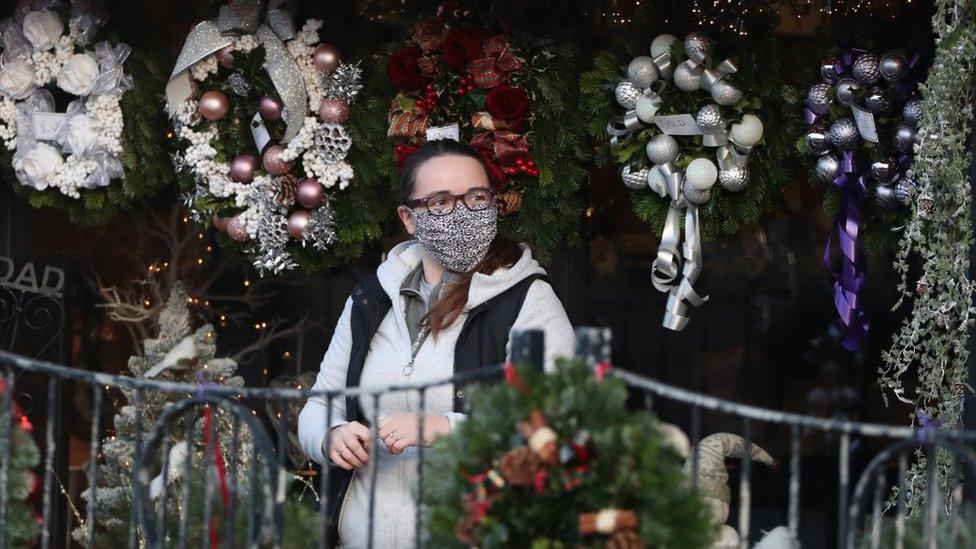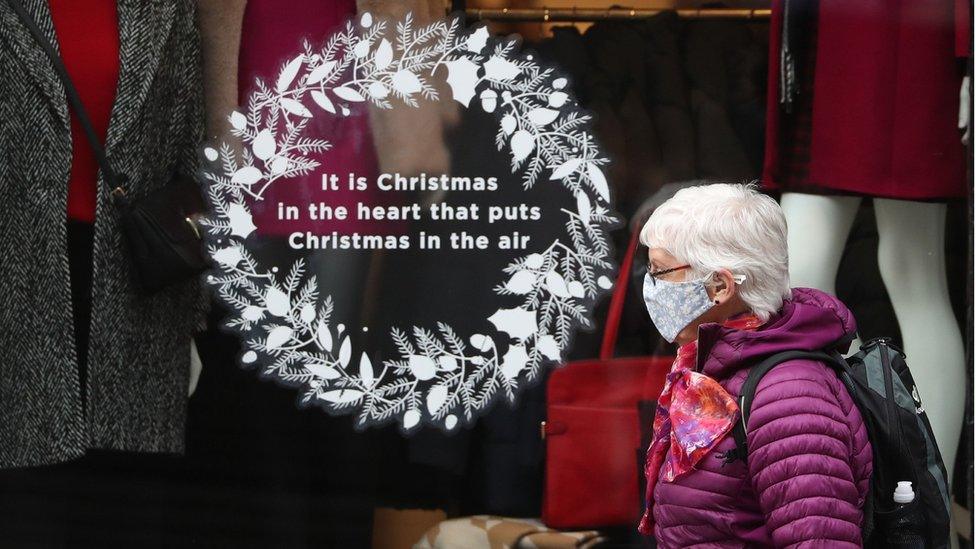Covid: Lockdown looms as Scotland tightens Christmas rules
- Published
Scotland's First Minister Nicola Sturgeon made the changes to restrictions in the wake of a new faster-spreading variant of Covid
Covid restrictions will only be relaxed on Christmas Day and mainland Scotland will then be placed under the tightest restrictions from Boxing Day.
First Minister Nicola Sturgeon said "firm preventative action" was needed after the emergence of a faster-spreading strain of coronavirus.
It had been planned to ease the rules between 23 and 27 December - but that will now only apply on Christmas Day.
A ban on travel to the rest of the UK will apply over the festive period.
Scotland's toughest level four rules will come into effect across mainland Scotland from 26 December.
Until then, local authority areas are expected to remain under their current level of restrictions.
Schools will return later than originally planned after the Christmas holidays.
Ms Sturgeon said they should resume from 11 January, with learning taking place online until at least 18 January.
The level four restrictions, external - which mean the closure of non-essential shops, pubs, restaurants and gyms - will last for three weeks.
They will apply across Scotland, with the exception of Orkney, Shetland, the Western Isles and other island communities where restrictions have recently been reduced. These areas will be placed in level three, external.

The first minister said, external decisive action was required because of a new strain of Covid which public health officials believe could be 70% more transmissible than previous strains.
At this stage she said there was no evidence to suggest the new strain made people sicker than earlier variants, or that it would change the effectiveness of the vaccine.
The new variant was first seen in mid-September in London and Kent - but by December it had become the "dominant variant" in London.
Government advisers believe the new variant could increase the R number - or reproductive rate of the virus - by 0.4 or more.
Ms Sturgeon said the speed at which it could spread meant this was "probably the most serious and potentially dangerous juncture we have faced" in the pandemic. But, she said Scotland still had the opportunity to act on a preventative basis.
So far 17 cases of the new strain had been identified in Scotland through genomic sequencing.
"We do not yet know how widely this new strain of virus is circulating in Scotland, but I think we have to be realistic that that is likely to be an understatement of its true prevalence right now," she added.
There was a "concern", however, that this strain may be driving what appears to be faster transmission of Covid in some hospitals and care homes.
Covid figures published at 14:00 on Saturday, external showed Scotland had recorded 41 new deaths and 572 positive tests over the previous 24 hours.
The first minister said Scotland's case numbers did not look as bad as those elsewhere in the UK, and that she understood why people might not understand that these steps were necessary.
But she said the new strain of the virus could very quickly "overwhelm us".

"Please believe me when I tell you... I would not be standing here on the Saturday before Christmas announcing this if I did not think this was necessary," Ms Sturgeon added.
Scotland has the lowest case rate in the UK, with 112.6 cases per 100,000 of the population.
This compares with 571.7 in Wales, 219.6 in England and 174.9 in Northern Ireland.
Restrictions have also been tightened up over the Christmas period in England and Wales.
The planned relaxation of the rules has been scrapped for large parts of south-east England, and cut to just Christmas Day for the rest of England and Wales. A fourth tier has also been created for some of the worst affected areas in England.
Cross-border travel ban
The first minister said maintaining a "strict travel ban" would prevent more of the new strain entering Scotland from other parts of the UK, and reduce the risk of it spreading further within Scotland.
This ban will remain in place throughout the festive period, meaning that cross-border travel will only be allowed for essential purposes.
Ms Sturgeon said she would be asking the police to consider how the enforcement of the ban could be strengthened.
Indoor mixing will be allowed on Christmas Day only. A maximum of eight people from three households will be allowed in law but the advice is to keep numbers to a minimum, external, celebrate in your own home, and meet others outdoors.

But Ms Sturgeon said: "If you can't make it there and back in the same day, please don't go - and we're asking you not even to do that unless you feel there is genuinely no alternative."
Police Scotland said they would not be routinely stopping vehicles or setting up road blocks.
"However, officers may in the course of their duties come across people who are travelling from one local authority area to another," said Assistant Chief Constable Alan Speirs.
"Where travel restrictions apply, officers will continue to use the common sense, discretion and excellent judgement that they have applied since the crisis began."
Scottish Conservative leader Douglas Ross said families would be "devastated", but that he understood why the restrictions were necessary.
"None of us want this, but these sacrifices will save lives," he said.
Scottish Labour leader Richard Leonard said the Scottish government needed to publish "persuasive evidence" to avert a "heightened risk of non-compliance".
The Scottish Liberal Democrats and the Scottish Greens both backed the moves, while calling for schools to close early for Christmas.

VACCINE: When will Scots get it?
NUMBERS: Five key figures to watch out for
LOCKDOWN: Six months that changed our lives
